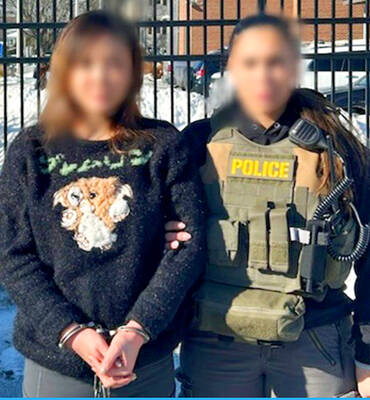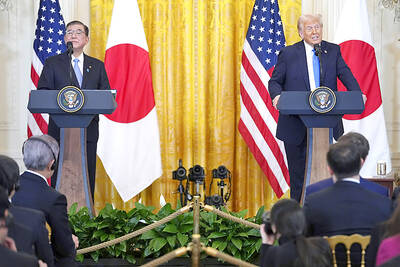Plans by Taipei’s private Shih Hsin University (SHU) to halt enrollment of new students in its Chinese literature department starting from the fall 2025 semester have sparked debate over the future of humanities education in Taiwan.
In a statement on Monday last week, Shih Hsin University said that it was preparing to submit a proposal to the Ministry of Education to phase out the department due to declining enrollment.
In response to the announcement, the department’s student association accused the university of “selectively” disclosing data in its proposal, by emphasizing the department’s 54 percent enrollment rate in the 2022-2023 academic year and ignoring that it rebounded to 87 percent in 2023-2024.

Photo: Rachel Lin, Taipei Times
Regardless of enrollment figures, “the impact of [Taiwan’s] declining birth rate should not lead to the sacrifice of core subjects,” the association said, asking the university to reverse the decision and recognize the humanities’ role in fostering “whole person education and critical thinking.”
When asked about the issue yesterday, Minister of Education Pan Wen-chung (潘文忠) was noncommittal, saying his ministry typically holds an annual review of such applications by universities in February or March.
Citing legal amendments made in 2018 allowing students to take more classes outside their disciplines, Pan encouraged universities to also show more “flexibility” in designing their degree programs.
“Halting enrollment and cutting or merging departments is not necessarily the way to handle such matters,” he said.
On the broader issue, Pan said Taiwan “needs to cultivate talent in both the humanities and the sciences, and should not allow industrial development trends to affect the diversity of students’ educations.”
In response to media queries, Hsu Kuo-neng (徐國能), a professor in National Taiwan Normal University’s Department of Chinese, said that aside from the general challenge posed by Taiwan’s declining birthrate, enrollment in the humanities is particularly threatened by the perception that it is “less practical” than fields such as business, law or government.
Despite these challenges, he said he is not pessimistic about his field’s future, as long as it could find ways to integrate tradition with modernity.
As an example, Hsu cited his department’s Literature Creation Program, in which students take part in script writing and production of theater, television or documentary film projects.
Meanwhile, Lin Chi-ping (林啟屏), a professor in National Chengchi University’s Department of Chinese Literature, pushed back against the notion that universities should function primarily as “professional training centers.”
The humanities constitute a sort of “foundational curriculum,” and as such, should receive more support from government policies, Lin said.
Still, Lin said that much of what the humanities teach a student cannot be quantified, which puts it at odds with societal expectations that knowledge and abilities could easily be seen and measured.

Johanne Liou (劉喬安), a Taiwanese woman who shot to unwanted fame during the Sunflower movement protests in 2014, was arrested in Boston last month amid US President Donald Trump’s crackdown on illegal immigrants, the Criminal Investigation Bureau (CIB) said yesterday. The arrest of Liou was first made public on the official Web site of US Immigration and Customs Enforcement (ICE) on Tuesday. ICE said Liou was apprehended for overstaying her visa. The Boston Field Office’s Enforcement and Removal Operations (ERO) had arrested Liou, a “fugitive, criminal alien wanted for embezzlement, fraud and drug crimes in Taiwan,” ICE said. Liou was taken into custody

The US-Japan joint statement released on Friday not mentioning the “one China” policy might be a sign that US President Donald Trump intends to decouple US-China relations from Taiwan, a Taiwanese academic said. Following Trump’s meeting with Japanese Prime Minister Shigeru Ishiba on Friday, the US and Japan issued a joint statement where they reaffirmed the importance of peace and stability in the Taiwan Strait and support for Taiwan’s meaningful participation in international organizations. Trump has not personally brought up the “one China” policy in more than a year, National Taiwan University Department of Political Science Associate Professor Chen Shih-min (陳世民)

‘NEVER!’ Taiwan FactCheck Center said it had only received donations from the Open Society Foundations, which supports nonprofits that promote democratic values Taiwan FactCheck Center (TFC) has never received any donation from the US Agency for International Development (USAID), a cofounder of the organization wrote on his Facebook page on Sunday. The Taipei-based organization was established in 2018 by Taiwan Media Watch Foundation and the Association of Quality Journalism to monitor and verify news and information accuracy. It was officially registered as a foundation in 2021. National Chung Cheng University communications professor Lo Shih-hung (羅世宏), a cofounder and chairman of TFC, was responding to online rumors that the TFC receives funding from the US government’s humanitarian assistance agency via the Open Society Foundations (OSF),

ANNUAL LIGHT SHOW: The lanterns are exhibited near Taoyuan’s high-speed rail station and around the Taoyuan Sports Park Station of the airport MRT line More than 400 lanterns are to be on display at the annual Taiwan Lantern Festival, which officially starts in Taoyuan today. The city is hosting the festival for the second time — the first time was in 2016. The Tourism Administration held a rehearsal of the festival last night. Chunghwa Telecom donated the main lantern of the festival to the Taoyuan City Government. The lanterns are exhibited in two main areas: near the high-speed rail (HSR) station in Taoyuan, which is at the A18 station of the Taoyuan Airport MRT, and around the Taoyuan Sports Park Station of the MRT